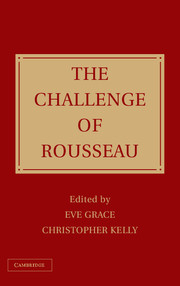Book contents
- The Challenge of Rousseau
- The Challenge of Rousseau
- Copyright page
- Contents
- List of Contributors
- Acknowledgments
- List of Abbreviations
- Introduction
- Part I Politics and Economics
- Part II Science and Epistemology
- Part III The Modern or Classical, Theological or Philosophical, Foundations of Rousseau’s System
- Part IV Rousseau as Educator and Legislator
- 9 The Measure of the Possible
- 10 Rousseau’s French Revolution
- 11 Rousseau’s Challenge to Locke (and to Us)
- 12 Stalking Puer Robustus
- Part V Unease, Happiness, and Death
- Index
10 - Rousseau’s French Revolution
from Part IV - Rousseau as Educator and Legislator
Published online by Cambridge University Press: 05 January 2013
- The Challenge of Rousseau
- The Challenge of Rousseau
- Copyright page
- Contents
- List of Contributors
- Acknowledgments
- List of Abbreviations
- Introduction
- Part I Politics and Economics
- Part II Science and Epistemology
- Part III The Modern or Classical, Theological or Philosophical, Foundations of Rousseau’s System
- Part IV Rousseau as Educator and Legislator
- 9 The Measure of the Possible
- 10 Rousseau’s French Revolution
- 11 Rousseau’s Challenge to Locke (and to Us)
- 12 Stalking Puer Robustus
- Part V Unease, Happiness, and Death
- Index
Summary
- Type
- Chapter
- Information
- The Challenge of Rousseau , pp. 230 - 252Publisher: Cambridge University PressPrint publication year: 2012



